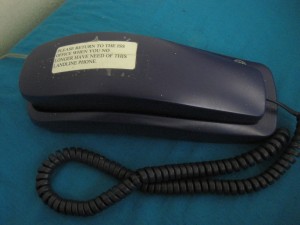 It wasn’t always likely that I would have spent half a year in one of the world’s biggest telecommunication’s markets – the United States of America – without a mobile phone. Surely, six months ago, I couldn’t have envisioned my current position. Two feet away from my left hand at this moment is a telephone that could only remind me of Nigeria. Not even the current day Nigeria, but the Nigeria of 1990. The telephone is hooked into the wall via a transparent cable. It has a dialing pad attached to the receiver, and it doesn’t have an answering machine, and it has a coiling cord that always used to give me nightmares. The last time I came across a phone with this kind of winding cable connecting the receiver to the box was in my grandfather’s house in the early to mid-nineties when we made the best of times by making prank calls to local Fire and Police Stations telling them of a raging fire. I therefore could not immediately believe when I walked into my designated apartment back in August that I was indeed in the United States of America. It was a kind of culture shock to come in contact with a land line phone of this ancient kind. There is usually a three-lettered abbreviation to respond to this kind of encounter. I went with OMG!
It wasn’t always likely that I would have spent half a year in one of the world’s biggest telecommunication’s markets – the United States of America – without a mobile phone. Surely, six months ago, I couldn’t have envisioned my current position. Two feet away from my left hand at this moment is a telephone that could only remind me of Nigeria. Not even the current day Nigeria, but the Nigeria of 1990. The telephone is hooked into the wall via a transparent cable. It has a dialing pad attached to the receiver, and it doesn’t have an answering machine, and it has a coiling cord that always used to give me nightmares. The last time I came across a phone with this kind of winding cable connecting the receiver to the box was in my grandfather’s house in the early to mid-nineties when we made the best of times by making prank calls to local Fire and Police Stations telling them of a raging fire. I therefore could not immediately believe when I walked into my designated apartment back in August that I was indeed in the United States of America. It was a kind of culture shock to come in contact with a land line phone of this ancient kind. There is usually a three-lettered abbreviation to respond to this kind of encounter. I went with OMG!
Cut to six months later, I am surprised to have survived it. My little nephews and nieces who are used to Nigeria’s now ubiquitous mobile phone services might be shocked now to see that phones exist in this kind of form. The only reason I can think of why I backed down from my promise to buy myself one of either the Samsung Omnia, the Nokia Maemo, the Apple iPhone, the Palm Pre, the Google HTC or the Blackberry among so many others new inventions competing for attention then was the contract system that made it a prerequisite that one had a payment plan with a major telecommunications network before getting a good smart phone. No can do, I said to Apple, which was my very first choice, and effectively walked away from the rest of them. There was no way I could sign up for a two year plan when my programme was going to end in eleven months. For phone calls home therefore, I depended on Skype, and Rebtel. For text messages, there was Skype, and my good old smart Nokia that followed me from across the ocean. For calls within campus, there remained my good old ancient line now hooked to the wall. It works just fine except I manage to step out of the room when the incoming call rings.
Needless to say, the non-possession of an American-network-powered mobile phone has never failed to generate very long conversations within friends and acquaintances whenever I bring it up. “Why don’t you just buy one of those little mobiles that you can recharge and use at will without a contact? Walmart has them,” I’ve been told. “I just can’t care less,” I respond, “In Nigeria, you can just walk up to any shop and buy a sim card without a contract, then buy the kind of smart mobile phone you want and still get all the services you require; a service you can walk away from at any time without loss. In America, it’s well almost an impossibility without a certain discomfort. Even the new iPad comes with the prerequisite of an AT&T contract. I mean what kind of exclusivity is that? Thankfully, I have been able to do without them all. Not like my friend Vera however. Read what she has to say about a phone contract with T-mobile. It is not just the figures, but the whole thing about a contract that just ticks me off.
It is just the sorry sight of this land line on my bed that reminds me of why Nigerians quickly got rid of the military government, and welcomed a civilian one. Today, even for “third world” Nigeria, I would never buy a phone like this. Not when I can buy the new contract-free Google Nexus combine it with an MTN simcard that costs less than a dollar. This sight reminds me of why I am a true ghoul in the forest!
PS: Amount so far raised via KTravulaid for Jos, for Haiti = $230, out of which $100 has already been sent to Jos. Thanks to Dee, Clarissa and Tee.
2 Comments to Non-Pretty Telecom Ramblings so far. (RSS Feeds for comments in this post)